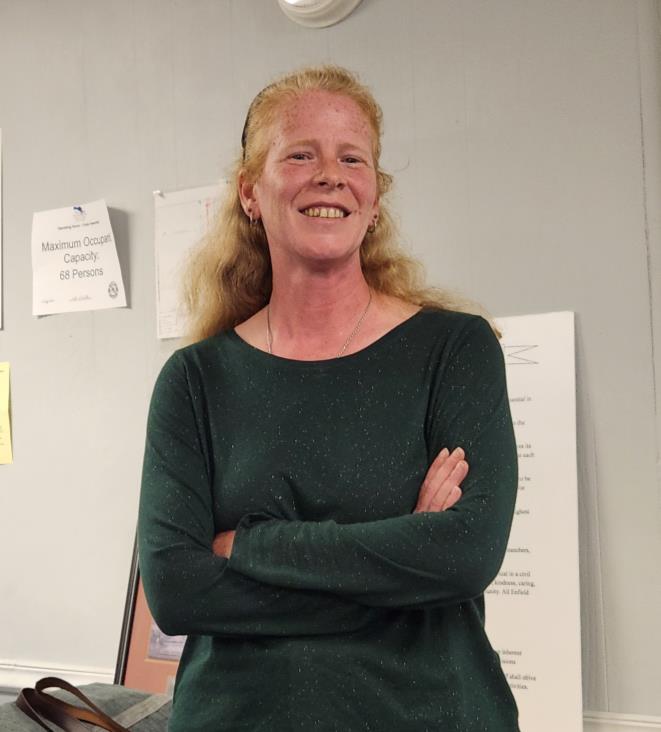by Robert Lynch; November 14, 2025
Governor Kathy Hochul didn’t want to do it. But the courts gave her little choice. A gubernatorial-backed New York law and building code update that would ban the installation of fossil fuel-fired furnaces and gas cooking stoves in most new Empire State homes won’t take effect New Year’s Eve as Hochul and state lawmakers had hoped.

Attorneys for the Governor’s Department of State and industry plaintiffs who’d challenged the New York prohibition entered a stipulation Wednesday in Federal District Court suspending the New York prohibition pending appeal of a federal lawsuit.
The stipulation would likely postpone implementation of New York’s All Electric Buildings Act well into 2026, if not longer.
Meanwhile, unrelated to the pending litigation, the Enfield Town Board, during its meeting October 22, adopted a resolution urging Hochul to delay the law’s implementation on grounds that the local electric grid lacks capacity to handle the load a rapid transition to heat pump technology would require.
“The Enfield Town Board welcomes the intelligent, aspirational transition to renewable energy sources for home heating and associated energy applications, yet also recognizes the infrastructure limitations that currently impede total electrification efforts in rural communities such as its own,” the Town Board’s request for a gubernatorial intervention stated.
Enfield’s late-October action—taken at a session otherwise called to hear public testimony and vote on the Town’s 2026 Budget— followed an initiative advanced earlier that month by a Cortland County community to thwart the all-electric heating and cooking mandate.
The Cincinnatus Town Board’s resolution took a different path than did Enfield’s. Cincinnatus supported a federal bill that would override New York’s mandate. Enfield lawmakers chose not to embrace the Republican-sponsored federal legislation.
“I’m not going to give up my gas stove,” Gray Road’s Cortney Bailey asserted during floor privileges at the start of the Enfield Board’s October 22 meeting. ”At least when the power goes out for five days when my son was five or six, I could still cook without having power. (Bailey’s son is now grown.)
As for the All Electric Buildings Act, “I think that’s very harmful for our area,” Bailey said. “I honestly think that they’re thinking everybody lives in the damned city.”

“There’s been a lot of talk about this, and it’s scary,” this writer, Councilperson Robert Lynch, author of the Enfield resolution, advised the Town Board that night. “I’m all for heat pumps; we have them in this building,” he said of the Enfield Courthouse, where the Town Board meets. “And if people want them, that’s fine, but I don’t think we should force people to have them.”
The All Electric Buildings Act, long-sought by New York’s environmental activists, was one of those measures snuck into a mammoth budget authorization bill in the spring of 2023, a bill so big that footnotes that chip away at personal freedom become hard to spot and evade the news cycle.
Under what’s now Section 11-104 of the New York Energy Law’s “Energy Conservation Construction Code,” the 2023 law advises us that “to support the goal of zero on-site greenhouse gas emissions and help achieve the state’s clean energy and climate agenda… the code shall prohibit the installation of fossil-fuel equipment and building systems, in any new building not more than seven stories in height… on or after December thirty-first, two thousand twenty-five.”
The seven-story threshold would, of course, conveniently carve out a temporary waiver for developers of commercial high-rises. Builders of large commercial and industrial buildings gained a similar reprieve. Yet the code would nonetheless require all newly-built structures, either tall or short, large or small, to comply with the fossil-free mandate beginning in 2029.
As currently enacted, the All Electric Buildings Act would affect only new construction, not existing homes or commercial buildings. Yet some fear regulatory creep: Once the camel of the nanny state gets its head inside the tent of your basement or kitchen, some among us worry runaway regulation could extend itself downward to homeowner replacement furnaces and range-tops as well.
As always, what Albany legislators and their green-building allies find so easy to enact in the dead of a legislative night years ahead of a deadline can come back to bite them when that deadline actually looms large. To that point, media reports indicate that as many as nine moderate Assembly Democrats had signed a letter in October asking Governor Hochul to roll back the statewide mandate. Hochul remains adamant that the new law take hold as soon as legally possible.
But it was the courts, not legislators that succeeded in imposing this latest postponement.
In October 2023, the National Association of Home Builders, the National Propane Gas Association, and various energy and construction trade groups banded together and sued the state in federal court. The petitioners, including current lead plaintiff, Mulhern Gas Company, Inc., claimed that New York State had overstepped the bounds of federal authority when Albany unilaterally imposed the fossil fuel construction ban. The plaintiffs claimed federal statute pre-empts the state’s actions.

The federal district court for the Northern District of New York upheld New York’s new codes last July 23. But the plaintiffs appealed their case to the United States Court of Appeals, Second Circuit. The parties’ stipulation of November 12 stays imposition of the fossil fuel building ban until the Second Circuit can rule on the appeal. And it would extend the stay for 120 additional days beyond the decision.
Whichever side lost the appeal could then petition further to the U.S. Supreme Court. And the stay would similarly block implementation until after the High Court rendered its decision.
Had the parties not agreed to delay the law’s effective date, the district court would have acted on the petitioners’ motion to enjoin New York from implementing key portions of its Energy Law.
In accepting the stipulation and delaying implementation, plaintiffs and the state made clear that this is an action dictated by procedure, not substance.
“The stipulation and order shall not in any manner be construed as determinative of the issues or claims raised in this action or any other proceeding of any kind and shall have no precedential value,” the latest court filing stated.
Appeals take time. They can take a long time. If Mulhern v. Mosley—Walter Mosley is New York’s Secretary of State—were to go all the way to the Supreme Court, one could see the All Electric Buildings Act being sidelined well into 2027.
Contacted by reporters, a spokesperson for Governor Hochul expressed disappointment that the ban on new fossil fuel installations won’t take effect this New Year’s Eve, as was planned.
“The Governor remains committed to the all-electric-buildings law and believes this action will help the State defend it, as well as reduce regulatory uncertainty for developers during this period of litigation,” Ken Lovett, the governor’s senior communications advisor for energy and environment, emailed multiple news outlets concerning the appeal. “Governor Hochul remains resolved to providing more affordable, reliable, and sustainable energy for New Yorkers,” Lovett added.

Yet some environmental activists and their legislative allies have cried foul, maintaining in recent days that the governor’s latest action reflects a softening of her environmental policy; the third of three recent walk-backs, one of them paving the way toward crypto mining on Seneca Lake.
In urging Governor Hochul to wield her executive power and delay the heat pump-friendly laws until electric grids can handle the load and homebuilders can fathom the curtailment of their liberty, the Enfield Town Board last month walked somewhat cautiously. The Town Board urged regulatory restraint, yet jettisoned a portion of a draft resolution that would have endorsed a Republican Congressional initiative, named the “Energy Choice Act.” It’s a bill that would pre-empt New York’s prohibition more broadly.
The Energy Choice Act is the brainchild of New York representative Nick Langworthy and West Virginia Senator Jim Justice. Congressman Langworthy represents much of the western Southern Tier and south Buffalo regions that Ithaca’s former Congressman, Tom Reed, once represented.
Whereas the Mulhern group of plaintiffs must argue in court a case of federal preemption that’s ambiguous and nuanced, the Langworthy-Justice legislation imposes a firmer hand:
“A State or local government, or instrumentality or regulatory agency thereof, may not adopt, implement, or enforce a law, regulation, ordinance, building code, standard, or policy that prohibits or limits, or has the effect of directly or indirectly prohibiting or limiting the connection, reconnection, modification, installation, transportation, distribution, expansion, or access to an energy service based on the type or source of energy that is sold in interstate commerce to be delivered to an end-user of such energy service,” Congressman Langworthy’s bill would unapologetically order. Senator Justice’s bill carries identical language.
“I’m generally OK with this,” Councilperson Jude Lemke said of the initially-drafted Enfield resolution, “but I’m not OK with the provisions of the Energy Choice Act,” Lemke added. “It’s very broad, and I’m not sure that it is a good idea.”
Endorsement of the Langworthy-Justice bill was the cornerstone of the Cincinnatus Town Board’s October 14 resolution, passed unanimously, that launched the opening salvo of municipal resistance to the All Electric Buildings Act. The Cortland County town’s resolution gained statewide attention. It prompted Enfield to follow suit.
“The Town Board urges Congress to pass the Energy Choice Act to defend consumer choice, protect energy affordability, and preserve reliable access to natural gas for all New Yorkers,” the Cincinnatus resolution stated.

Following Cincinnatus’ lead, this Enfield Councilperson, Robert Lynch, drew upon its language in drafting Enfield’s “Resolution to Support Freedom of Homeowner Energy Choice.” To gain unanimous support from others, this Councilperson deleted the paragraph to which Lemke objected, the federal bill’s endorsement. Instead, the Enfield board inserted a sentence that Lemke had recommended:
“Resolved, that this Town Board urges Governor Hochul and the New York State Legislature to develop policies that result in diverse sources of energy to help residents obtain cost effective energy while continuing to expand renewable energy sources within the State over time,” Councilperson Lemke’s amendment stated.
But despite deference to compromise, the local resolution remained adamant that “the Enfield Town Board urges Governor Hochul to exercise her executive authority to whatever extent permissible and suspend the impending implementation of the New York State Energy Code’s prohibitions on the installation of fossil fuel equipment and building systems for new construction, prohibitions that would otherwise take effect on December 31, 2025.”
“I get calls in the 24 hours of the power going out,” Enfield Supervisor Stephanie Redmond told the Town Board at the October meeting, speaking as the board headed toward a vote. “People are desperate,” Redmond reported, “and I always urge people to have backup for their backup for their backup.” The Supervisor said she urges residents have a backup generator, backup heat, and a wood stove.
Stephanie Redmond, by choice, lives in a home off-grid.
The Cincinnatus resolution scripted its advocacy on the presumptive ability of new homeowners to tap into natural gas. But not one natural gas pipe intrudes into Enfield. And none may ever do so should the All Electric Buildings Act eventually take effect.
Indeed that lack of available cheap gas may stand in part to blame for Enfield’s stagnant economic growth. Town Planning Board Chair Dan Walker earlier last month informed the Town Board that new subdivision applications in Enfield this year have virtually ground to a halt.
“We could have a lot more expansion if somebody would extend a natural gas line into Enfield, but nobody has yet,” this Councilperson advised. “It’s not necessarily the future, but it would help our growth.”
“Let them know this is a really bad idea,” Cortney Bailey reflected on the state law as the Town Board sent its Freedom of Homeowner Energy Choice message on to Albany for Hochul or whoever else to read.
“We might be smaller in number than the people who live in cities,” Bailey said of herself and her rural neighbors, “but we’re still here, and we should not have to meet such outrageous demands when they (the leaders in Albany) can’t even make sure that we can have power consistently all the time.”
“I’m not putting electric baseboard heaters in,” Bailey insisted. “That is insanity.”
###

